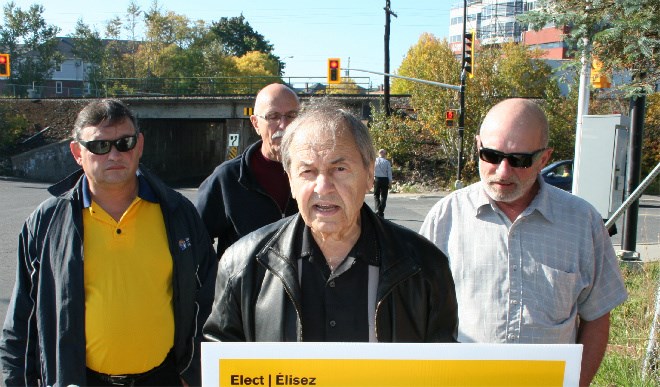If elected mayor, John Rodriguez says he's open to using municipal bonds to help the city narrow its $700-million infrastructure deficit.
However, speaking to reporters at a downtown news conference Friday, Rodriguez said local taxpayers shouldn't have to bear the full cost. He would only use bonds if the federal and provincial governments agreed to each pay one-third of the cost, and the city didn't have the money for its share.
“Any plan to deal with this accumulated deficit must span multiple years and involve the provincial and federal governments as equal funding partners,” he said. “The City of Greater Sudbury cannot and should not assume financial responsibility for the total cost of addressing this issue.”
While the city's robust credit rating means it could borrow as much as $700 million, Rodriguez said borrowing that much at one time is “bad policy.” Not only would the debt repayments consume the city's entire roads budget of about $46 million a year, it would exceed the work capacity of local contractors and suppliers.
“We must be more practical and realistic if we are to resolve the infrastructure problem,” he said.
When asked how upper levels of government could be convinced to provide the infrastructure funding, Rodriguez said the federal government is looking at a $15-billion budget surplus and a major national infrastructure program was likely in the offing with an election scheduled next year.
And the province, which has already committed its one-third share of $26 million to the Maley Drive Extension, has another $200 million fund for these sorts of capital projects, he said.
If you take the $700-million infrastructure deficit, divide it by three and spread it out over eight years, that amounts to $29 million a year that would have to be raised locally, he said.
“This expenditure would be raised by both annual capital budgeting, the strategic use of debentures and private-sector partnerships,” Rodriguez said, adding he would make addressing the issue a priority. “We can no longer afford to simply talk about it.”
He also committed to finish Maley Drive in his first term, and “will push to complete the four-laning from Azilda to Chelmsford.”
In addition to roads and water and sewer infrastructure, Rodriguez said recreational and cultural infrastructure needs to be dealt with. Many arenas – including Sudbury Arena – need upgrading or replacing, and the private sector could play a role in helping fund those projects.
“Also, our cultural infrastructure, such as an art gallery, a performing arts centre, a new central library, need to be planned and implemented. This infrastructure will need the participation of the private sector and public investment from all levels of government.”
Rodriguez, who was mayor from 2006-2010, is running in the Oct. 27 vote to get his old job back. He's facing off against Dan Melanson, the former president of the Greater Sudbury Taxpayer's Association; Ward 5 Coun. Ron Dupuis; and former Auditor General Brian Bigger, who's on unpaid leave from his job. Jeff Huska, Richard Majkot, Ed Pokonzie, Jean Brohart and David Popescu round out the field of candidates.
Join Sudbury.com+
- Messages
- Post a Listing
- Your Listings
- Your Profile
- Your Subscriptions
- Your Likes
- Your Business
- Support Local News
- Payment History
Sudbury.com+ members
Already a +member?
Not a +member?
Sign up for a Sudbury.com+ account for instant access to upcoming contests, local offers, auctions and so much more.
